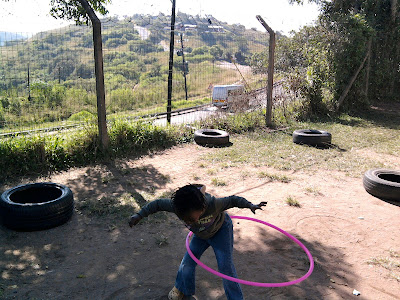Week 4 at Rainbow Creche! This week it was only the student Occupational therapists and Audiologists at the creche, as the Speech therapists were conducting assessment at another venue.
We have been looking at doing listening activities with the children in the creche to develop various auditory skills. Up until this point, the only clinical therapy I have done as a student audiologist has been speech therapy, language therapy and currently, aural rehabilitation. So again, I felt challenged and slightly out of my comfort zone, not knowing where to begin. Thankfully, I have found a program for preschool children that is soley focused on developing auditory skills.
The program can be downloaded for free off the UK's Department for Education
here. The activities are quite lovely! Many of the activities are active, which is great for us as we can add in some goals for OT and Speech therapy. Reading through some of the activities, I am learning to think more creatively about activities and developing listening skills.
We started this week off by making bunny ears with the children, which were used to make the children aware of their ears and listening during later activities. The children were required to colour in a template- which incorporated fine motor skills, while we whispered instructions to them. Whispering requires the children to actively listen and pay attention to what is being said (This worked out well for us as we had to keep the noise levels down for hearing screening that was being conducted next door).
Before beginning the session, we met and discussed how we can correct the children if they are colouring incorrectly, and how to encourage better listening and concentration. I feel that this was highly beneficial as the OT's and audio's each learned something from the other profession, that enabled us to actively participate during each activity. I learned about identifying if a child is using the incorrect grip when holding a pencil, encouraging the children to rest their hand on their page and move their wrist while colouring, and that children should be using longer crayons and pencils, as opposed to small stubbs, as this will help to develop the right grip. The OT's also explained how different hand strengthening exercises can be done using playdough that will aid in the development of fine motor skills.
As student audiologists, we were able to share with the OT's about getting a child's attention before explaining an activity, encouraging them to sit still and not talk while listening, and gently holding a child's hands while talking to them if they are finding difficulty in sitting still and paying attention.
I feel that this time of sharing before beginning activities should be done each week, so that we are able to learn valuable skills from each other that we can apply both to CBR and other clinics.
This week we were able to begin hearing screenings on the children. We decided to start with the children who are most at risk for having a hearing loss (eg. child with cleft palate, delayed fine/gross motor skills, and those who battle to follow instructions). This required us to consult the OT's, as they have spent more time with the children than us. Our aim is to screen all of the children, but since we are only there once a week, it may take a while to accomplish this. One of the children that the OT's suggested that we screen first did not pass the hearing screening and is being referred for a full diagnostic assessment. I now realise how beneficial a team approach can be for identifying those at risk.
We wont be at the creche this coming week, as it is human rights day! I look forward to being back the following week, with our full team :)

















